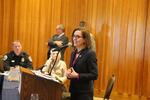
Oregon Gov. Kate Brown addresses her Council on Wildfire Response at a meeting Thursday, Sept. 26, 2019.
Courtesy of Gov. Kate Brown
Oregon Gov. Kate Brown got a progress report from her Council on Wildfire Response on Thursday, and it came with a hefty price tag.
The board is advising the governor on how to change the state’s wildfire policy in response to growing wildfire risks from overstocked forests, population growth and climate change.
Council Chair Matt Donegan told the governor that one of the major changes the board is recommending is increased investment in wildfire suppression.
"It just stands to reason that in an era of climate change, in an era of fuel buildup and in an era of population growth and increased wildfire activity that we’re going to have to spend more resources suppressing fire," he said.
He said the state will need an estimated $4 billion in "a multi-decade initiative that will involve significant state, federal and private investment" to reduce wildfire risks through actions such as logging overstocked forestland.
“That number feels a bit overwhelming," Brown said in response. "But I think it’s critically imperative that we bite off a significant chunk right now — immediately.”
The governor said she wants to spend more to improve wildland firefighting capabilities, increase controlled burning and help communities live with more wildfire smoke.
"There isn't really a fire season anymore. It's year-round. It's increasing in Oregon and frankly around the entire globe," she said. "I obviously know we need to do things differently and we need different tools and we clearly need additional resources."
Critics say the council’s early recommendations are biased toward logging and putting out wildfires rather than letting forests burn as they naturally would and making homes more fire-resistant.
Ralph Bloemers with the Crag Law Center said he’s worried the state will be relying too much on destructive logging to help pay for its new policy.
“My big concern is that the forest is going to be asked to pay for it. Which means the thing that we love, that we're trying to restore, is going to be degraded," he said. "And there’s going to be more opportunities for fire to visit that landscape.”
In a letter to the council, Dominick DellaSala, chief scientist at the Geos Institute, said the kind of logging the council's early reports advise "will not protect communities, stop fires in extreme conditions, or prevent smoke from affecting our communities."
"Simply put, we cannot log/manage or suppress our way out of wildfires," he wrote. "As the climate changes and we experience more drought and extreme temperatures, we can expect more extreme fire weather that will overtake our ability to suppress fire."
He advised the council to focus on solutions that help people live with fire such as making homes more fireproof and adding smoke shelters for communities near forests.
In response to critics, the governor said redesigning the state's wildfire policy is "a balancing act" and she's hoping that a combination of strategies will help avoid negative wildfire impacts like the ones Oregon experienced with the Eagle Creek Fire in the Columbia River Gorge in 2017.

